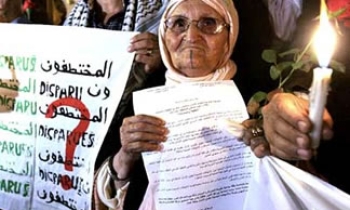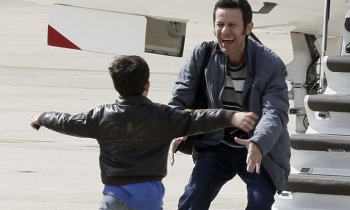By some reckonings, the death of two journalists working for CBS News on Monday firmly secured the Iraq war as the deadliest conflict for reporters in modern times.
Since the start of the war in 2003, 71 journalists have been killed in Iraq, a figure that does not even include the more than two dozen members of news media support staff who have also died, according to the Committee to Protect Journalists. That number is more than the 63 killed in Vietnam, the 17 killed in Korea, and even the 69 killed in World War II, according to Freedom Forum, a nonpartisan free speech advocacy group.
"It is absolutely striking," said Ann Cooper, the executive director of the Committee to Protect Journalists. While cautioning that the recorded number of journalists killed in past conflicts may be inexact, she said: "We talk to veteran war correspondents who have covered everything going back to Vietnam and through Bosnia. Even those who have seen a number of different wars say they have never seen something like this conflict."
In the latest incident, a veteran cameraman, Paul Douglas, 48, and a soundman, James Brolan, 42, were killed, and a correspondent, Kimberly Dozier, 39, was seriously wounded when the United States Army unit in which they were embedded was attacked.
All three had extensive backgrounds covering wars and each had volunteered to work in Iraq.
They set out Monday morning to do what might seem simple: spend a few hours with soldiers, hoping to give the audience back in America a glimpse of what this holiday was like, far from family barbecues and beach vacations. Ms. Dozier sent a note to her colleagues before leaving, CBS News said, saying she was working on a report about an wounded serviceman who insisted on returning to Iraq.
On this day, their reporting ended less than a mile outside the fortified Green Zone when a car laden with explosives was detonated just as the crew members stepped from their armored vehicle, military officials said.
An American soldier and an Iraqi translator also died, and six more soldiers were wounded in the attack. The condition of the wounded soldiers was not available last night. Ms. Dozier was rushed from the scene to a military hospital in Baghdad, where she underwent an operation, and then was moved to a hospital north of Baghdad for a second operation. When her condition allowed it, she was to be flown to Germany for more care. She suffered extensive wounds to her legs and shrapnel wounds to her head, CBS News said.
"Terrible is exactly the right word for this day," said Sean McManus, president of CBS News. "The ironic thing of course is that it was Memorial Day. But everyone here is a professional, and we're going to move forward and do our jobs."
Ms. Dozier has reported numerous stories for CBS from Iraq over the past three years. She had been embedded with other units and, like most reporters in Iraq, had endured close calls. "Every time Kimberly has left Iraq she has asked, 'When can I get back in there?' " Mr. McManus said. "She was particularly determined to report on Iraq. This is what really drove her."
Before going to Iraq, Ms. Dozier worked as chief correspondent for WCBS-TV in New York, based in its Middle East bureau in Jerusalem. She has covered news ranging from the hunt for Osama bin Laden to the crises in the Balkans. She was well aware of the risks involved in reporting from Iraq, recalling her frustration with the difficulty of telling the story of ordinary Iraqis during a 2004 interview with CNN.
"The last time I tried to do that — to go to someone's home and sit down with that man and say, 'Are you thinking about leaving Iraq or staying?' — the moment he saw me, blond hair and my two armored vehicles," Ms. Dozier said, "he turned white."
Her colleagues who were killed were equally experienced.
Mr. Douglas, the cameraman, had worked with CBS since the early 1990's. Based in London, he had traveled to some of the most dangerous countries in the world, including Afghanistan, Pakistan, Bosnia and Rwanda. Big and brawny, he is seen in photos released by CBS smiling and playing the ham, posing with flak jacket on, helmet under his arm and a smirk breaking through his goatee. He left behind a wife, two daughters, three grandchildren and his mother.
Mr. Brolan, a former soldier in the British Army, was a freelancer who, during the course of the past year, worked as a soundman for CBS News in Iraq and Afghanistan. Noted for his quick wit, he once made George Clooney laugh, joking about their physical resemblance during an interview, colleagues at CBS News said. Mr. Brolan was part of the CBS team that won an Overseas Press Club Award in 2006 for its coverage of the earthquake in Pakistan. He had a wife and two teenage children.
CBS, like other major news organizations, has been struggling to cover the war while providing security for its employees, including their Iraqi employees, who often go places Westerners cannot.
Still, it is Iraqi journalists who have been most at risk.
Just this month, three Iraqi reporters were killed in a two-week period, according to Reporters Without Borders. In addition to those killed, at least 42 journalists have been kidnapped, according to the group.
Even the seeming security of being with the American military carries substantial risk, as it did in January, when the ABC anchorman Bob Woodruff and Doug Vogt, a cameraman, suffered severe injuries in a roadside bombing in Iraq.
The death of the CBS journalists was the first time since 2003 that reporters embedded with the American military had died as a direct result of hostile fire.
The CBS crew, by all accounts, was wearing the standard protective gear.
"I think Kimberly just saw this as an opportunity to be on the ground with the troops on Memorial Day," he said, "to hear their thoughts, to see what they see."









